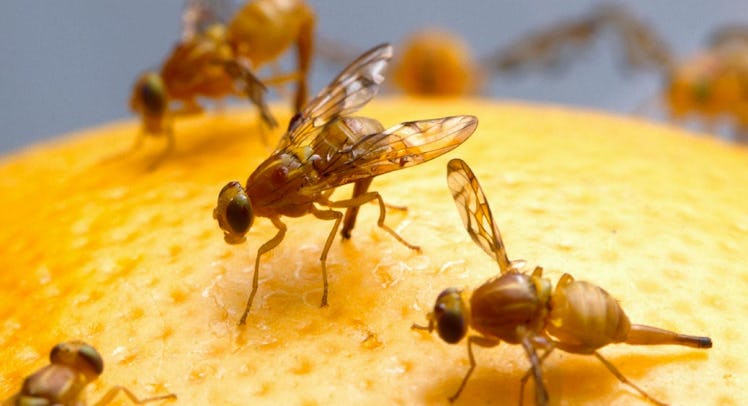These Neurons Keep Fruit Flies Up All Night To Get Lucky
Fruit flies are just like us. Maybe.

Fruit flies, they’re just like us—at least when it comes to their competing sex and sleep drives. A new study suggests that dedicated neurons called MS1 help male fruit flies balance their needs for sex versus sleep, and suppress the urge to conk out in the presence of eligible female flies. Although the findings to date have limited implications for humans, the study sheds new light on the neural mechanisms that some animals use to prioritize sex over their basic needs.
“To my knowledge, this is the first paper to report the interaction between sleep drive and sex drive in fruit flies,” Kyunghee Koh, neuroscientist at Thomas Jefferson University in Philadelphia and coauthor on the study told Fatherly. She says the findings suggest that “a small number of neurons use octopamine, a fruit fly version of human norepinephrine, to suppress sleep specifically in males so that they can engage in courtship.”
eLife | Single-beam DAM data demonstrating reduced male sleep in the presence of females.
Fruit flies and humans aren’t the only animals that forgo sleep for sex. Male arctic sandpipers barely catch a handful of Z’s during their three-week mating periods, and antechinus swear off both food and sleep (the males don’t last very long). Although scientists have known about these behaviors for some time, the neural mechanisms behind the choice to sleep or get romantic has long remained a mystery. But prior studies suggested that the neurotransmitter norepinephrine (and its fruit fly analogue, octopamine) may have something to do with whether or not that brain calls it a night.
In this new study, Koh and colleagues demonstrate that a small cluster of MS1 neurons release octopamine in male fruit flies, keeping them awake when female fruit flies are around. When Koh and her team silenced the MS1 neurons, the male fruit flies went to sleep even in front of the females, and when they artificially activated MS1, the flies remained wired and unable to sleep, even when they were alone. Messing with these same neurons had no obvious effect on female flies.
Koh plans to continue studying MS1 in the hopes of identifying the network of neurons that activate sleep suppression. In the mean time, she suspects similar mechanisms may be at work in the human brain whenever we decide to forgo sleep—whether it be for sex, or for night feedings, early mornings, and the many sleep-deprived indignities of new parenthood. “Norepinephrine may be important for balancing sleep drive and sex drive in humans,” Koh says. “More generally, it may be important for suppressing sleep for other essential behaviors, not just sex.”